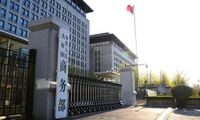China has escalated its trade standoff with the United States by announcing a fresh round of sanctions against six American companies, a move that comes despite a planned high-level meeting between President Donald Trump and Chinese leader Xi Jinping. The announcement, made on Thursday, September 25, 2025, by China’s Commerce Ministry, underscores the deepening rift between the world’s two largest economies—a rift that shows little sign of healing, even as both sides publicly express a desire to resolve their differences.
According to the Associated Press and multiple news agencies, three U.S. companies—Saronic Technologies, Aerkomm, and Oceaneering International—have been added to China’s so-called “unreliable entity list.” This designation effectively bans them from trading with China, a move that could have serious implications for their global operations. The Commerce Ministry accused these firms of “engaging in so-called military-technical cooperation with Taiwan, severely undermining China’s national sovereignty, security and development interests.”
For those unfamiliar with the significance of this list, being named an “unreliable entity” in China can mean everything from loss of access to Chinese markets and suppliers to reputational damage that ripples far beyond the country’s borders. Saronic Technologies, a manufacturer of unmanned vehicles; Aerkomm, a satellite technology company; and Oceaneering International, a subsea engineering firm, now find themselves squarely in Beijing’s crosshairs.
The backdrop for these sanctions is the ever-contentious issue of Taiwan. China views the self-ruled island as a breakaway province, to be annexed by force if necessary. The Chinese government has long bristled at any foreign involvement with Taiwan’s military, and recent months have seen a steady drumbeat of measures aimed at isolating the island. In July 2025, Beijing imposed export controls on eight enterprises tied to Taiwan’s military, signaling a willingness to use economic levers to reinforce its political claims.
But the latest sanctions didn’t stop there. In a separate action announced the same day, China added three more American companies—Huntington Ingalls Industries, Planate Management Group, and Global Dimensions—to its export control list. This prevents these firms from receiving Chinese shipments of items deemed “dual use,” meaning they have both civilian and military applications. The Commerce Ministry said these companies “endanger China’s national security and interests,” a phrase that leaves little room for ambiguity about Beijing’s intentions.
Huntington Ingalls Industries is a major U.S. military shipbuilder, while Planate Management Group specializes in engineering and facilities management, and Global Dimensions is known for its intelligence and consulting services. For these companies, being cut off from Chinese exports could disrupt supply chains and complicate ongoing projects, especially those that rely on specialized components manufactured in China.
According to AP and other outlets, the timing of these sanctions is particularly notable. Just days earlier, on Friday, September 19, 2025, President Trump and President Xi held a lengthy phone call. The two leaders agreed to meet in person at a regional summit in South Korea at the end of October, with the stated aim of addressing a raft of contentious issues—including trade, technology transfers, and the thorny question of who will ultimately control the social media platform TikTok.
Both Beijing and Washington have publicly stated their desire to “iron out differences” in these areas. But the imposition of new sanctions, especially ones tied so explicitly to the Taiwan issue, suggests that the road to any meaningful agreement will be anything but smooth. After all, the U.S. has long maintained a policy of “strategic ambiguity” regarding Taiwan, providing the island with military support without formally recognizing it as a separate country. China, for its part, has repeatedly warned that any foreign interference in what it sees as a domestic matter will be met with strong reprisals.
“The companies have engaged in so-called military-technical cooperation with Taiwan, severely undermining China’s national sovereignty, security and development interests,” the Commerce Ministry said in its statement. The language is unequivocal, and the intent is clear: Beijing is drawing a red line when it comes to Taiwan, and it expects foreign businesses to take heed.
The United States, meanwhile, has its own concerns about China’s use of economic power to achieve political ends. In recent years, American officials have accused Beijing of leveraging access to its vast market as a way to punish companies and countries that run afoul of its policy preferences. The sanctions announced this week are just the latest example of what many in Washington see as a troubling trend.
Still, there are economic realities that neither side can ignore. The U.S. and China are deeply intertwined, with billions of dollars in goods, services, and intellectual property flowing between them every year. Disruptions to this relationship—whether through tariffs, export controls, or outright bans—have the potential to send shockwaves through global supply chains, affecting industries from technology to agriculture.
The upcoming summit in South Korea is shaping up to be a critical moment. Both leaders have a great deal at stake: President Trump faces pressure at home to stand up to China, especially on issues of trade and national security, while President Xi must balance the need to project strength abroad with the economic realities of a slowing domestic economy. The question on everyone’s mind is whether the two sides can find enough common ground to de-escalate tensions, or whether the cycle of sanctions and counter-sanctions will continue unabated.
Adding to the complexity is the issue of technology and data security. The ownership of TikTok, a wildly popular social media platform with hundreds of millions of users worldwide, remains unresolved. Both Washington and Beijing have cited national security concerns in their respective negotiations, with each side wary of ceding control over sensitive data and algorithms.
For now, the sanctioned companies are left in limbo, forced to navigate a geopolitical landscape where business decisions are increasingly entangled with the shifting winds of international politics. As trade lawyers and analysts scramble to assess the potential fallout, one thing is clear: the era of predictable, rules-based engagement between the U.S. and China may be over, replaced by a new normal where economic power is wielded as a tool of statecraft.
Whether the upcoming summit will mark a turning point or simply another chapter in a long-running saga remains to be seen. But as both sides prepare for what could be a pivotal meeting, the stakes—for companies, consumers, and governments alike—have rarely been higher.





